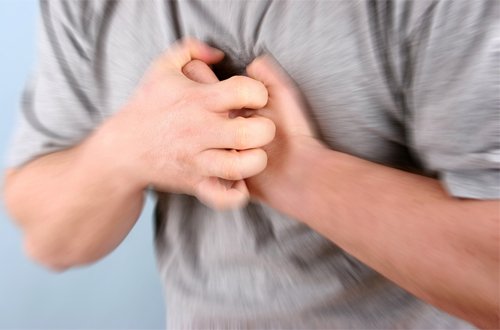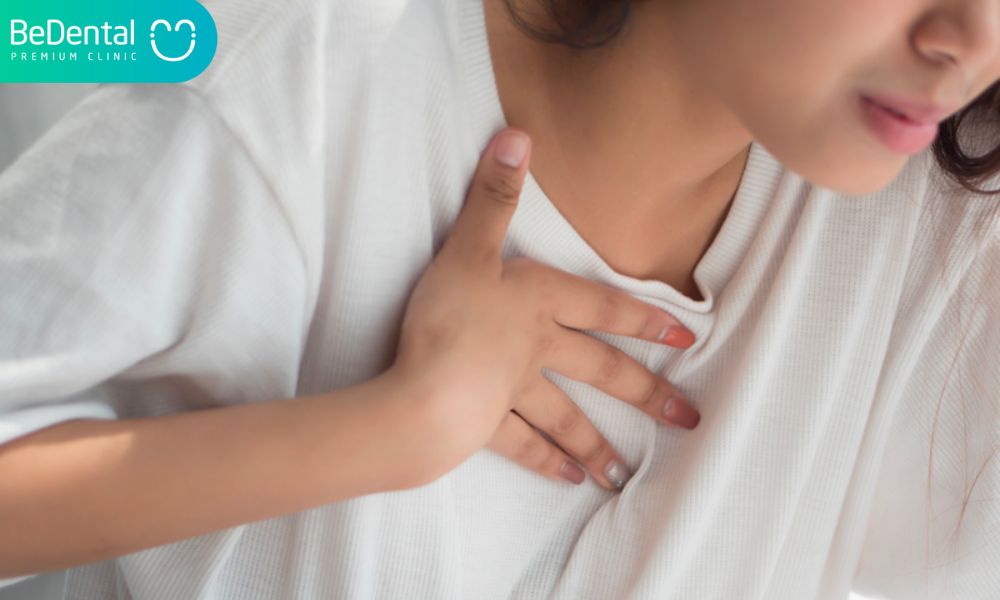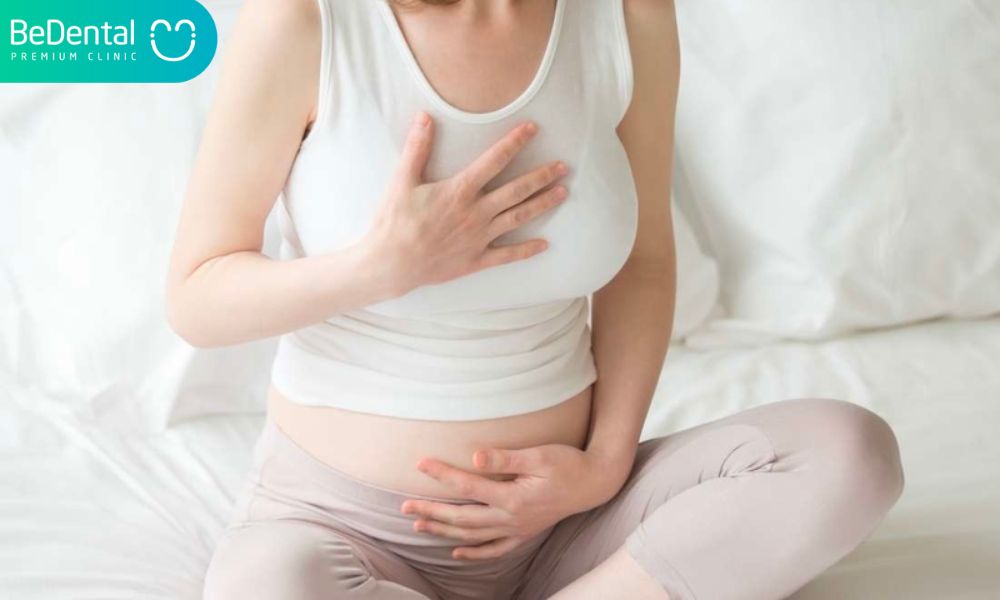Chest pain or discomfort is a common condition in individuals of all ages. Chest pain can occur due to various reasons and is not limited to older adults. This condition is currently trending towards rejuvenation and is often accompanied by other symptoms such as shortness of breath, nausea, and tightness or pain in the middle or both sides of the chest. So What is Central chest pain – causes of central chest pain ?
1) What is central chest pain?
Central chest pain refers to the uncomfortable sensation in the middle of the chest or a deviation towards the left side. Sometimes, patients may not describe it as pain but rather as a feeling of intense pressure, squeezing, or constriction. It may also be accompanied by palpitations, shortness of breath, sweating, and trembling of the hands and feet.
The most concerning underlying cause of recurring central chest pain is the obstruction of blood flow to the heart. This condition leads to localized myocardial ischemia, and if it progresses, it can cause myocardial infarction, increasing the risk of death.
2) What are the causes of central chest pain?
The chest cavity contains various internal organs, so any internal injury can cause the sensation of central chest pain. Even organs within the abdominal cavity, such as the stomach, liver, gallbladder, and spleen, can manifest as chest pain due to the referred pain mechanism and the transmission of primitive nerve fibers. Therefore, it is crucial to explore these symptoms in detail to accurately determine the underlying cause.
Doctors always consider cardiovascular diseases as the primary cause of central chest pain. Abnormalities in the coronary arteries, atherosclerosis, reduced blood supply, and myocardial ischemia are often the first signs of chest pain.
Patients describe a constricting pain located in front of the sternum that radiates to the anterior region of the heart. It commonly occurs during exertion, brisk walking, climbing stairs, or psychological stress.
The pain will decrease or stop during rest. However, in rare cases, it may persist even during rest, sudden worsening of chest pain with intense intensity, sweating, and difficulty breathing, and no relief with rest. In such cases, it is necessary to consider the possibility of myocardial infarction or complete coronary artery occlusion.
In addition, other cardiovascular conditions such as coronary artery spasm, arrhythmias, heart failure, myocarditis, etc., can also present with central chest pain.
Apart from the heart, respiratory organ-related diseases such as pneumonia, asthma, obstructive pulmonary disease, pleurisy, pleural effusion, pneumothorax, lung cancer, etc., can also be accompanied by central chest pain, along with symptoms such as fever, cough, shortness of breath, and wheezing.

Some patients may feel pain in the shallow area above the chest wall, localized or radiating along the ribs, which can be attributed to intercostal nerve pain or pain from muscle and chest wall trauma or compression.
Central chest pain is also a symptom of digestive system disorders. Patients may describe vague chest pain accompanied by poor appetite, loss of appetite, nausea, vomiting, acid reflux, heartburn, bloating, and indigestion.
The common causes include gastric and duodenal ulcers, gastroesophageal reflux disease, and colitis. Additionally, chest pain can also be caused by diaphragmatic or hepatic compression.
Relatively “benign” cases of chest pain are more common in women around menopausal age, and the mechanism is related to hormonal changes or psychological reasons such as anxiety and nervousness.
3) Is central chest pain dangerous?
Is central chest pain dangerous? Due to the various causes of pain, the impact of this symptom depends on the organ causing the disease.
If central chest pain is truly caused by the cardiovascular system, it is a dangerous condition that threatens life at any time. With stable angina, which only occurs during exertion and decreases during rest, it is a sign that the coronary arteries have started to narrow, limiting blood supply to the heart.
If this condition is subjectively ignored and left untreated for a prolonged period, it can lead to myocardial infarction, causing damage to the heart muscle. If not promptly treated, it can lead to death from heart failure.

If this condition is subjectively ignored and left untreated for a prolonged period, it can lead to myocardial infarction, causing damage to the heart muscle. If not promptly treated, it can lead to death from heart failure.
4) Some common types of chest pain
There are various types of chest pain that can be a symptom of different diseases. Here are some common types of chest pain we often encounter.
4.1. Chest pain with difficulty breathing
People with coronary artery disease may experience chest pain along with difficulty breathing. However, the phenomenon of chest pain with difficulty breathing can also be caused by various other factors, not just heart disease.
Some cases of chest pain and difficulty breathing may be due to gastroesophageal reflux or temporary respiratory inflammation.
Moreover, anxiety and psychological stress are also among the causes of chest pain and difficulty breathing. Prolonged tension and nervousness can cause changes in our breathing patterns, resulting in symptoms such as cyanosis, rapid breathing, and oxygen deprivation.
In addition, chronic conditions such as liver or kidney disease, lipid disorders, and diabetes can also cause chest pain and difficulty breathing.
For chest pain and difficulty breathing unrelated to any underlying medical condition, you only need to maintain a healthy diet and engage in appropriate exercise to control this condition. Balancing your work and reducing stress can help prevent such chest pain.
4.2. Chest pain with indigestion
Indigestion refers to symptoms such as bloating, fullness, water retention, or flatulence that make you feel like vomiting after meals. The phenomenon of chest pain and indigestion can also be accompanied by other symptoms such as dizziness, lightheadedness, discomfort, and aching in the stomach.
Furthermore, people experiencing chest pain and indigestion may also have symptoms of acid reflux, heartburn, and esophageal burning.
This symptom is mainly caused by an improper diet. In this case, you need to balance your nutrition and consume foods that are beneficial for digestive health, especially bananas, yogurt, or papayas.
Additionally, you should limit or avoid all types of snacks and foods high in fat, fried or greasy dishes, and carbonated drinks.
4.3. Chest pain with nausea
Chest pain and nausea are not actually a specific illness, but rather a manifestation of human psychology. In some cases, these symptoms may be signs of conditions such as:
– Gastroesophageal reflux disease.
– Respiratory diseases.
– Women in the early stages of pregnancy.
In this case, you only need to adjust your lifestyle, adopt a healthy lifestyle, and limit stimulants such as alcohol, beer, and especially cigarettes. If this condition persists, you should visit healthcare facilities for examination and evaluation.

4.4. Chest pain accompanied by cough
Coughing accompanied by discomfort in the chest is a common condition in people with cough, cold, etc. This condition will resolve after a few days when you recover from the cough.
However, if you experience chest pain in the morning accompanied by dry cough, persistent coughing even after taking cough medicine and anti-inflammatory drugs, you should be aware that this is a symptom of lung cancer.
The main cause of this dangerous condition is excessive smoking. Harmful substances from cigarettes will remain in the lung mucus for a long time and lead to the development of cancer. This results in frequent chest pain accompanied by cough, especially in the early morning.
To prevent this condition, we need to maintain clean household hygiene, stay away from cigarette smoke, and ensure good air quality. In addition, to avoid experiencing cough and chest pain, you need to treat any respiratory and lung-related diseases if you have them.
4.5. Chest pain when swallowing food
Chest pain when eating and swallowing, if it occurs frequently, may be a symptom of esophageal cancer. In this case, the patient may not have specific symptoms or only experience chest pain when swallowing food, which lasts for a prolonged period without a clear cause.
If the symptoms become more severe, causing the patient to feel tightness in the chest or a sensation of obstruction in the throat, making it difficult to swallow food, you should see a doctor immediately.
Initially, the condition will cause the patient to choke on large pieces of food, and as the disease progresses, even small pieces of food or even porridge can cause choking.
5) What should you do when you experience chest pain?
When experiencing chest pain, the first thing you need to do is stop all activities and rest, avoiding exertion or heavy work. If chest pain and discomfort occur frequently, you should visit healthcare centers for examination and treatment if necessary.
You need to determine the cause of prolonged chest pain in order to pursue appropriate treatment.
For cases of chest pain due to cardiovascular diseases, patients need to be very cautious in their daily activities, always adhere to the guidelines set by the doctor, and follow a suitable diet and sleep regimen as prescribed.
6) Steps to alleviate chest pain
Chest pain is a common symptom that can cause a lot of anxiety for patients. Reducing chest pain will make you feel more comfortable and help prevent dangerous complications. Here are a few steps to alleviate chest pain:
- Rest: If you are working, stop and relax to relieve pain. If you are lying down, change your sleeping position to reduce pressure on the chest.
- Use nitroglycerin: This is a pain-relieving medication for chest pain caused by insufficient blood supply to the heart muscle. If prescribed by a doctor, use it according to the instructions.
- Adjust your diet: Avoid overeating or hunger, and avoid high-energy and fatty foods.
- Drink water: If chest pain is caused by alcohol, caffeine, or nicotine consumption, drink filtered water to reduce the amount of stimulants and toxins in the body.
- Perform breathing exercises: You should practice breathing exercises to alleviate chest pain. Take deeper breaths and hold the breath for a few seconds, then exhale slowly.
- Massage: If you feel chest pain, gently massage the area to alleviate the pain.
If chest pain persists, worsens, or is accompanied by other symptoms such as difficulty breathing, nausea, and fatigue, you should see a doctor for diagnosis and early treatment.
Tư vấn chuyên môn bài viết:
TS.BÁC SĨ NGUYỄN HỮU QUANG
BEDENTAL - TOP STANDARD DENTISTRY SYSTEM
In HANOI
Address 1: 7B Thi Sach St, Ngo Thi Nham, Hai Ba Trung Dist, Ha Noi. - 0934.61.9090
Address 2: No 129 Hoang Ngan, Yen Hoa, Cau Giay Dist, Ha Noi. - 0934.61.9090
In HO CHI MINH
Address 1: 53 -55 -57 Pho Duc Chinh St, Nguyen Thai Binh, Dist. 1, Ho Chi Minh. - 0766.00.8080
Working: 9am - 8pm everyday
Website: https://bedental.vn/en/
HƯỚNG DẪN ĐI KHÁM TẠI BỆNH VIỆN RĂNG HÀM MẶT TRUNG ƯƠNG NĂM 2023
Cạo vôi răng bao nhiêu tiền tại BeDental? Địa chỉ thực hiện lấy vôi răng an toàn
Có Nên Nhổ Răng Khôn Số 8 Không? Khi Nào Thì Nên Nhổ? Có Nên Nhổ Răng Khôn Mọc Thẳng?





